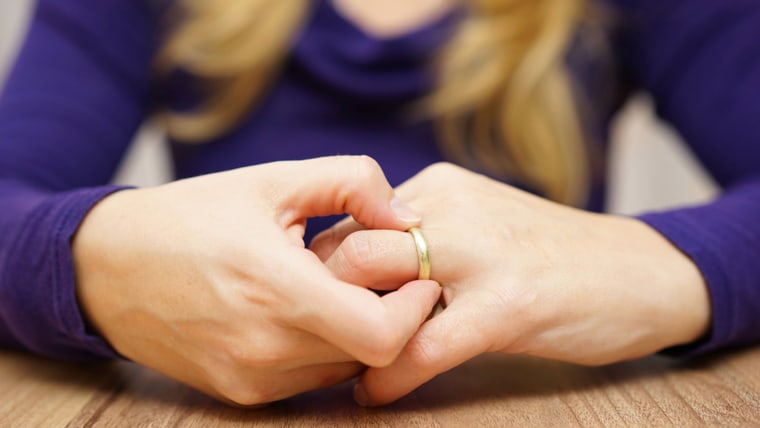Charlotte Markey studies the psychology of eating for a living, but even she was taken aback by how quickly she lost 10 pounds when she split from her husband.
Dubbed the “divorce diet,” the unexpected slim-down is a common side effect of even the friendliest separations. People who’ve been through it compare it to taking an appetite suppressant, with food becoming an afterthought.
RELATED: 10 things I wish I'd known before getting divorced

“I didn’t expect to be affected to severely,” Markey, 40, apsychology professor at Rutgers University and author of “Smart People Don’t Diet,” told TODAY.
“I really just couldn’t eat. I just had no appetite. Just the thought of food was nauseating.”
It felt not just emotional, but physiological, she added. "It goes to your guts, literally," a divorcee told The New York Times.
Celebrities go through it, too, with singer Blake Shelton speaking out about the phenomenon following his split from Miranda Lambert.
“The divorce happened and I just stopped eating,” Shelton told TODAY’s Hoda Kotb and Kathie Lee Gifford last fall. “I didn’t really think about it.”
RELATED: Thinking about getting a divorce? Ask yourself these 6 questions first
The biggest culprits are stress and anxiety, both well-known appetite killers. Divorce and separation are the second- and third-most stressful life events, right behind the death of a spouse, according tothe Holmes and Rahe Stress Scale, which ranks common stressors.
The experience can be overwhelming, with most people experiencing anger, grief, anxiety and fear, the American Psychological Association warns.
Nicole Baras Feuer, a divorce coach withStart Over Smart in Westport, Connecticut, estimates about three-quarters of her clients feel the effects of the “divorce diet.” Feuer experienced it herself — she lost 10 pounds when she divorced in 2009.
“The stress level is tremendous,” Feuer, 48, said. “Your adrenaline is so high. I wasn’t sleeping, I wasn’t eating well.”
RELATED: Splitsville stress: Divorce linked to higher heart attack risk
Control is also a factor. If you’re going through a divorce, you may feel overwhelmed by all the changes in your life, but you can control what kind of food you eat, Markey said. That’s not to say people are doing it consciously, she added.
For many, it’s also an incredibly energy-draining time of life. As the divorce unfolds, you have to keep working, try to not unsettle your children’s lives, pack, move into a new home and so on.
Once they finalize a split, people may lose weight for personal reasons. If you’re stuck in a miserable marriage and don’t take good care of yourself, a divorce is a chance to be more healthy, Feuer noted.
She also finds many new singles put emphasis on looking and feeling good because they want to go back into the dating world.
RELATED: What to say when a friend gets divorced
If you’re going through it now, the experts had these reminders:
1. Stress-induced appetite loss is not a healthy way to lose weight.
Markey didn’t want or need to lose weight, but she quickly shed 10 pounds and weighed less than she had since her first year of high school. Since she found food nauseating, she got the nutrients she needed by ingesting liquid calories — drinking smoothies and switching to whole milk — the opposite of what she usually advises people to do when they want to lose weight.
“It’s sad that people assume any time you’re losing weight, it’s a good thing. And it’s not, necessarily,” she said.
2. You’ll likely gain the weight back.
Both Markey and Feuer said they eventually returned to their normal weight.
“Your head sort of switches to… ‘I want to lose weight in the right way’ and do it because I want to feel good again and get my life back on track,” Feuer said.
3. Sleep, eat right and exercise.
Don’t skip meals, stay active to help with your anxiety and try to get enough rest, Feuer advised. If you can’t sleep, seek a doctor’s help, she added. Yoga and meditation can be particularly soothing during this stressful time.
Take care of yourself by getting emotional support from friends and family, the American Psychological Association advises.
4. Ask for help
As in many situations, women are apt to put themselves last, Markey said. Ignoring your own needs will make everything more difficult, especially if you’re tired, hungry or stressed. Ask for help and be specific — “Could you watch my kids this afternoon?” — because friends often don’t know what help to offer.
5. Think of divorce as an opportunity to start again.
Even if they want a divorce, people are often sad when it happens. Feuer tries to have them focus on new opportunities that wouldn’t be possible if they had stayed in the marriage.
“I try to help them see this is a time they can really have the life they always wanted. Because sometimes being in a marriage, especially in an unhappy marriage, held you back from some of the things you wanted to do,” she said. “It’s your opportunity to reflect. What is it you really want out of life?”